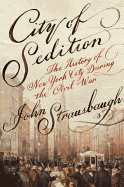
In City of Sedition, historian John Strausbaugh (The Village) explores New York City's multi-faceted role in the American Civil War. It was a role complicated by close financial ties with the South in the years immediately before the war; conflicts between recent immigrants and anti-immigration "nativists"; political corruption at all levels; and the rhetoric of competing "penny daily" newspapers. He portrays a city as divided by the war as any border state--so divided that in the months before the war, some political leaders proposed that New York City become a "free port" on the medieval model, seceding not only from the Union but from the state of New York.
Strausbaugh builds his portrait of the city from a multitude of smaller portraits. He tells the stories of well-known New Yorkers: popular preacher Henry Beecher, journalist Horace Greeley, Tammany Hall politician "Boss" Tweed and poet Walt Whitman. He follows less known figures over the course of the war, such as 12-year-old drummer boy Gus Schurmann, who enlisted with his father in the all-German Mozart brigade and spent an afternoon playing with Todd Lincoln. He considers the fates of slave ship captains, abolitionist businessmen, war profiteers and military units from all levels of New York society.
The final result is a richly layered and often surprising history, as crowded and fast-paced as a Manhattan sidewalk. --Pamela Toler, blogging at History in the Margins

